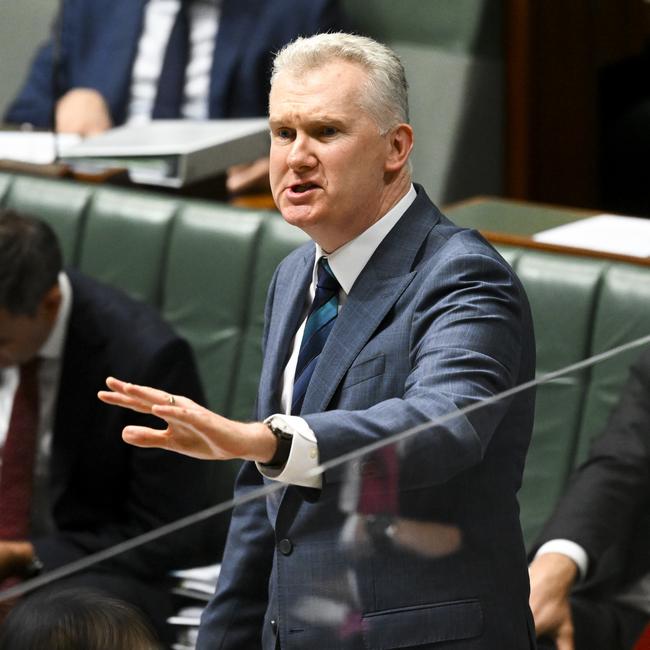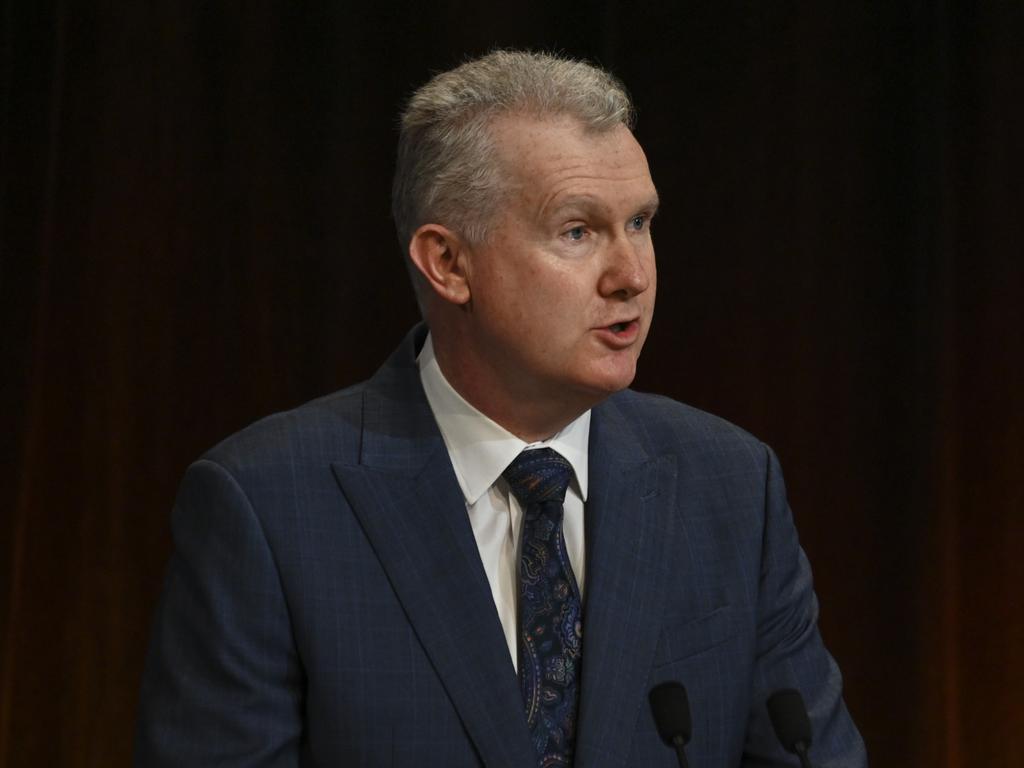No split bills: Anthony Albanese won’t give up on industrial relations reforms
Tony Burke will need to make more concessions to get IR reforms passed before Christmas after changes to Labor’s bill failed to win over the Senate crossbench.

Employment Minister Tony Burke will need to make more concessions to get the Albanese government’s industrial relations reforms passed before Christmas after changes Labor made to its bill failed to win over the Senate crossbench and business groups.
Senate crossbencher David Pocock, whose vote is critical to passage of the bill, is pushing to have a key element of the proposed expansion of multi-employer bargaining – the single interest stream – substantially amended or carved out of the bill and delayed until next year.
Senator Pocock dug in on Monday after Mr Burke announced a series of proposed amendments to the multi-employer bargaining streams, the arbitration powers of the Fair Work Commission and the operation of the legal test used to approve pay deals, as well as changes aimed at addressing concerns about the scrapping of the Australian Building and Construction Commission.
Mr Burke said the amendments followed a week of constructive consultations with business groups, unions and experts. “This bill is essential and urgent,” he said. “It will promote job security, help close the gender pay gap, modernise the workplace bargaining system and get wages moving after a decade of stagnation.
“Australians are struggling with the rising cost of living. Their wages are not keeping up with prices, and it’s clear the government has to intervene to increase access to bargaining and close the loopholes undermining wage growth.”

While Senator Pocock welcomed the amendments, he challenged the government to go ahead with the less controversial elements of the multi-employer bargaining changes.
“In order to urgently deliver pay rises for the lowest-paid workers, the government should move forward with the supported (low paid) and co-operative multi-enterprise bargaining streams now,” he said. “I look forward to continuing constructive engagement with the government, including on matters not covered in today’s updates and the more complex changes in the bill to make sure we get them right.”
The independent ACT senator said earlier that the bill was introduced just over a week ago, and in that time, the government had flagged a number of significant changes.
“This, coupled with the confusion and complexity associated with the legislation, says to me that we need more time. That’s why I suggested splitting the bill,” Senator Pocock wrote on Twitter.
“I see it as my job, and one I take very seriously, to make sure we get this legislation right.”
Australian Industry Group chief executive Innes Willox said the government’s willingness to begin a process of amending the bill was welcome but with “unjustifiably expanded multi-employer bargaining and associated strike rights at its heart, the bill remains fatally flawed”.
“A proposed amendment that would empower unions to prevent employers from putting a proposed multi-employer agreement to a vote of their workforces without union consent will hand unions an unreasonable level of control over the content of agreements,” Mr Willox said.
“A major concern for industry is that the criteria for when a union can seek a multi-employer agreement remains unreasonably loose.
“It would lead to an unjustified expansion of multi-employer bargaining and industrial action rather than encouraging parties to make agreements at the individual workplace level.
“Indeed, the amendments water down the scant safeguards originally contained in the bill regarding when multi-employer bargaining will be available. It is disappointing that we haven’t yet seen movement on this front.”
Under the government’s bill, the supported bargaining stream replaces the existing low-paid bargaining stream and the single-interest stream allows workers with a common interest to bargain together. Both streams allow for industrial action.
Mr Burke confirmed changes announced on Sunday to the bill’s proposed expansion of multi-employer bargaining as well as other amendments including changes to the better off overall test, the legal test applied to approved pay deals.

The multi-employer bargaining amendments provide that businesses and workers cannot be compelled into an authorisation or single interest employer agreement when they have agreed to bargain for a proposed single enterprise agreement, and a six-month grace period where there is a history of effective bargaining. The changes will require majority support from employees of each employer for a single interest bargaining stream authorisation. They make further changes to the better off overall test to ensure new employees under an agreement are not left worse off; and clarifies that the commission must be satisfied a minimum period of good-faith bargaining has occurred before moving to arbitrate.
The amended bill establishes the government’s promised new National Construction Industry Forum as a statutory advisory body; and gives business 12 months to adjust to changes to fixed-term contracts.
Mr Willox said that while the establishment of the National Construction Industry Forum would hopefully provide a forum for cultural change in the construction sector, “it is not a like-for-like replacement of the ABCC and the vital role it has played in maintaining order in the sector”.
“It is vital that the minister appoints strong voices for industry to the forum,” Mr Willox said.
“Changes to give employers with expired enterprise agreements a narrow window to negotiate a new instrument are welcome but fall well short of what is practically required to ensure that employers and employees can bargain at the workplace level.”
Opposition employment spokeswoman Michaelia Cash said the multi-employer bargaining provisions, with the ability for strike action across industries, could “close down Australia”, a claim ridiculed by Mr Burke in parliament. “Remember previously Senator Cash had said Labor policy would end the weekend which we had presumed that Monday to Friday were therefore still available,” he said. “Today the bill will ‘potentially close down Australia’. They’ve got a real sense of nuance, those opposite.”
Senator crossbencher Jacqui Lambie said it would be a “miracle” if the bill passed in its current form before Christmas.
More Coverage









To join the conversation, please log in. Don't have an account? Register
Join the conversation, you are commenting as Logout